Our Chicago Travel Essentials lays out all the vital info you need to plan your trip to one of the most popular destinations in the USA. No matter how frequently you travel, some questions will always need answers: What’s the weather like? How can I get from the airport to my hotel? What currency and type of plug do I need? We have all these answers and more, including the best times to go, how to get around, and a few other useful travel tips.
It’s all compiled in this Chicago Travel Essentials. After reading this short and easy-to-read guide, you will be a little more prepared to plan your trip to Chicago.
When is the best time to travel to Chicago?
Chicago weather

Chicago’s climate is humid continental with average temperatures ranging from -4ºC in winter to 24ºC in summer. Rainfall is evenly distributed throughout the year, with an average of 9 to 11 rainy days per month. Snowfall can be expected between December and March, and the warmest time of the year is from May to October.
The best time to visit depends entirely on what you’d like to see during your trip. Summer, from June to August, is peak tourist season, with hotel and flight prices rising accordingly. Alternatively, April to May and September to October are great times to visit, as the weather is pleasant, you’ll avoid the summer’s crowds and flight and hotel prices are more affordable.
Chicago Basics
Important info

Chicago’s primary language is English, though a fair amount of the population also speak Spanish. The city is a vibrant melting pot of cultures, so you might also hear Polish, Arabic, Tagalog and Chinese, including Cantonese and Mandarin. You’ll be able to use plug types A and B, with 120 V. As you may have guessed, the currency used is the United States dollar (US$).
The international dialling codes are +1 312 for Downtown and Loop and +1 773 for the rest of Chicago. The emergency telephone number is 911.
Se også
- 12 Most Popular Neighbourhoods in Chicago

12 Most Popular Neighbourhoods in Chicago
United States of America - Pilsen in Chicago

Pilsen in Chicago
United States of America - 10 Most Popular Streets in Chicago

10 Most Popular Streets in Chicago
United States of America
How to get to my hotel in Chicago?
Chicago’s main transport links

O’Hare International Airport sits 27 km northwest of central Chicago. A taxi or shared minivan shuttle to downtown Chicago takes 35–45 minutes. The public bus takes 50–60 minutes. The L and Blue Line trains take around 40 minutes. Midway International Airport is located 9 miles southwest of downtown. A taxi or minivan takes 20–40 minutes, while public buses will arrive in 40–50. Orange Line trains take 20–25 minutes.
Rent a car from either airport by taking the free shuttle from the terminal to the rental company compounds. Alternatively, if you arrive via Union Station, you’ll be right in the city centre. From here, taxis, buses and urban trains can take you to your hotel.
How to get around Chicago?
Travel tips

Chicago’s downtown is known as the Chicago Loop and it’s a lakeside area of roughly 1.5 by 3 kilometres. It’s very pedestrian-friendly and easily explorable by foot or bicycle. Public transport is well linked, with CTA buses running all over the city. The Blue and Red train lines run 24 hours a day, connecting you to the airport, Downtown and the North and South sides.
For high-speed journeys you’ll want the Metra. As well as taxis and Uber vehicles, you could take a water taxi, allowing you to both sightsee and travel in style. While you’re in Chicago, consider the Ventra app to purchase day passes for most public transport options and for live departure and arrival times.
Metro, elevated train and bus
Chicago’s well-connected public transport

The CTA (Chicago Transit Authority) runs public transportation in Chicago, apart from a few suburban services provided by Metra commuter rail and Pace suburban buses. The CTA’s subways and elevated train lines (L) cover most areas of the city, with buses filling the gaps.
You can easily pick up single tickets, or if you’re spending some time in the city grab a 1, 2, or 3 day CTA Pass from a variety of retail outlets, CTA rail and bus stations, or online. Our top tip is to familiarise yourself with the colour-coded lines in advance and take note of the interchange stations.
Taxi
Taxis are plentiful

You should have no trouble finding a taxi in Chicago, either by going to a marked taxi rank or by hailing one in the street. Uber, Lyft and Wingz apps can also be used to hail a taxi in Chicago, though if you need an accessible cab for a wheelchair or stroller, we recommend calling a local dispatcher to make sure you get the right kind of vehicle.
Payment is easy. If you’ve not already paid via an app, it’s usually possible to pay via credit card, although check with your driver before you get in and commit to the ride. It’s common to give the driver a 10 to 15% tip, so factor that into your budget.
Billede taget af Olivier Aumage (CC BY-SA 2.0) Redigeret
Cycling around Chicago
Bikes are beautiful

Biking is a great way to see Chicago and there are several downtown streets with bike lanes marked for your safety. You can bring your bike onto the bus or train for no extra charge and there are plenty of bike racks to lock them up while you enjoy the city’s attractions.
Don’t have your own bike? Divvy is Chicago’s bike sharing system. Just download the Divvy app to purchase a pass or go to any Divvy kiosk if you don’t have a mobile phone. Get a 24-hour Divvy Pass and type your code into the keypad on any dock to unlock the bike.
What are the main annual events in Chicago?
Music and culture, local and global

Events in Chicago are spread throughout the year, so whatever season you find yourself in Chi-Town you may be lucky enough to coincide with one of their major celebrations. One of the most famous is Saint Patrick’s Day on the 17th of March. You’ve no doubt seen photos of the river dyed green and there’s also a festive parade and parties at every Irish tavern in town.
If you’re a music buff, check out the World Music Festival Chicago that rolls around every September. You’ll find artists from Mali to Mongolia to give you a taste of their musical flavour. Chicago is also well-known as the Blues Brothers’ city, so if you’re visiting in June head over to the Chicago Blues Festival.
Billede taget af Mary (CC BY-SA 2.0) Redigeret
Denne artikel indeholder meninger fra Go Guides’ redaktion. Hotels.com kompenserer skribenter for tekster, som fremgår på denne side. Kompensationen kan inkludere rejser og andre omkostninger.
Planlæg din næste rejse
Her kan du overnatte i Chicago
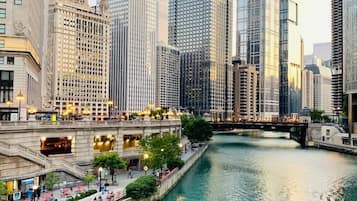
L7 Chicago by LOTTE
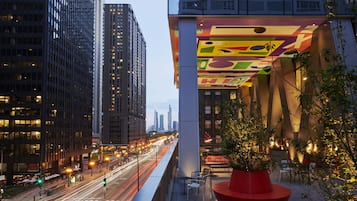
citizenM Chicago Downtown
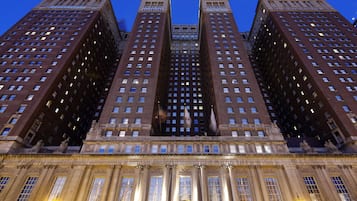
Hilton Chicago
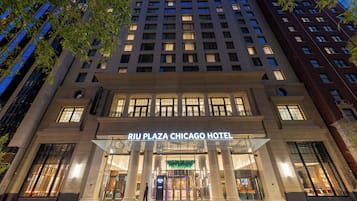
Hotel Riu Plaza Chicago

Palmer House a Hilton Hotel

Hotel Felix River North/Magnificent Mile

Congress Plaza Hotel

DoubleTree by Hilton Chicago - Magnificent Mile
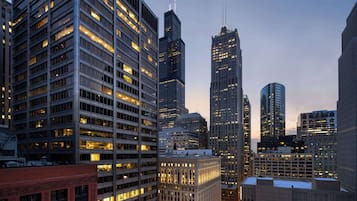
Hyatt Centric The Loop Chicago

Warwick Allerton - Chicago
Relaterede artikler
- 12 Most Popular Neighbourhoods in Chicago

12 Most Popular Neighbourhoods in Chicago
United States of America - Pilsen in Chicago

Pilsen in Chicago
United States of America - 10 Most Popular Streets in Chicago

10 Most Popular Streets in Chicago
United States of America - Centennial Wheel in Chicago

Centennial Wheel in Chicago
United States of America - Navy Pier in Chicago

Navy Pier in Chicago
United States of America - Shedd Aquarium in Chicago

Shedd Aquarium in Chicago
United States of America - 13 Best Places to Go Shopping in Chicago

13 Best Places to Go Shopping in Chicago
United States of America - Bronzeville in Chicago
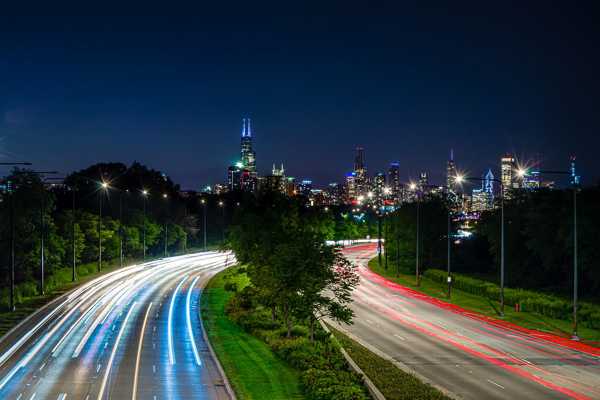
Bronzeville in Chicago
United States of America
